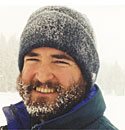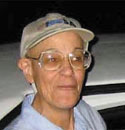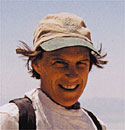|
By Tom Valtin
Brad Marston-Providence, Rhode Island
Rhode Island Chapter Chair
 As a child, Brad Marston backpacked in the Sierra Nevada with his father, and he loved disassembling machines and putting them back together. These youthful exploits led to his passion for the environment and his love of physics, the latter now his occupation as an associate professor at Brown University. As a child, Brad Marston backpacked in the Sierra Nevada with his father, and he loved disassembling machines and putting them back together. These youthful exploits led to his passion for the environment and his love of physics, the latter now his occupation as an associate professor at Brown University.
"As a physicist I'm concerned about global warming," Marston says. "I've been trying to educate other physicists about climate change. It's interesting how few scientists have carried out simple back-of-the-envelope calculations to appreciate the phenomenon."
He is equally concerned with daily life in Providence. "I walk to work," he says, "and when I started at Brown I realized the city had a problem with pedestrian safety. I got them to paint crosswalks on the streets and install pedestrian traffic signals."
Marston has lobbied at the state house and testified before the city council on sprawl-related issues such as greenhouse gas emissions and energy-efficient modes of transportation. "People here could take much better advantage of public transit," he asserts.
Marston, an avid yoga practitioner, and his wife Marcie enjoy backpacking in California and Colorado. Closer to home, they favor New Hampshire's White Mountains and the Rhode Island coast. Marston says Gary Snyder's poems were an early influence. "It's important to step back from the pell-mell rush of the modern world and ask where we are all headed."
Mary Brill-Sacramento, California
Sierra Club EPEC Organizer
 "Public policy is ineffective without a human face on it," says Mary Brill. "What's missing in the smart-growth movement is a sense of community. Too often the discussion is 'building-oriented,' not 'people-oriented.'" "Public policy is ineffective without a human face on it," says Mary Brill. "What's missing in the smart-growth movement is a sense of community. Too often the discussion is 'building-oriented,' not 'people-oriented.'"
In September, Brill was honored as Environmentalist of the Year by the Environmental Council of Sacramento. "Shortly after I moved here," she recalls, "I worked in a part of town where there were a lot of gang- and drug-related problems. That's when it hit me: How can we expect people to 'just say no' when there's nothing to say 'yes' to?"
Brill ascertained that certain funds could be redirected to help schools stay open later in the day for recreational-type programs, so she invited the superintendent and local elected officials to a meeting where the idea was discussed with neighborhood residents. The result was the successful "Art's Kool" program.
"I try to help people make connections so they can speak up for themselves," she says. "I'll get neighborhood residents together with people who have money, connections, and power. I'm able to put a couple of hundred people in a room for a meeting or a public hearing. That scares policy-makers.
"Environmentalists should understand the struggles faced by poor communities, and inner-city communities should understand how environmentalists can help them. There are people in the inner-city who care about the environment, and there are Club members who want more diversity in the environmental movement."
Robin Mann - Bryn Mawr, Pennsylvania
National Chair, Wetlands Working Group
 On the 30th anniversary of the Clean Water Act, the Clean Water Network named Robin Mann one of its Clean Water Heroes for her tireless work to protect wetlands. A long-time Sierra Club activist, she was also honored with the Club's Special Service Award this September. On the 30th anniversary of the Clean Water Act, the Clean Water Network named Robin Mann one of its Clean Water Heroes for her tireless work to protect wetlands. A long-time Sierra Club activist, she was also honored with the Club's Special Service Award this September.
Mann has lately been fighting to keep luxury homes from being built on an inholding in Valley Forge National Park. "Local officials tried to stop the project," she says, "but they were taken to court by the developer and ultimately had no recourse but to approve the project. The only option left was to acquire the inholding."
Mann spearheaded a rally to protect the park and circulated a petition for congressional funding of the land acquisition. The day before the rally, the Park Service announced it was negotiating with the developer to purchase the 62-acre lot.
"Robin took the lead in this fight," says Eric Ring, Southeastern Pennsylvania Group Chair. "She brought major news coverage to the issue and effectively persuaded the government to start negotiations with the developer, and she's so modest she doesn't even realize how good she is. Whenever she gives me information, I'm utterly confident it's correct."
Jeff Schmidt, Pennsylvania Sierra Club director, echoes Ring's sentiments. "Robin's the classic example of 'When you really want something done, ask a busy person.'"
Up to Top
|